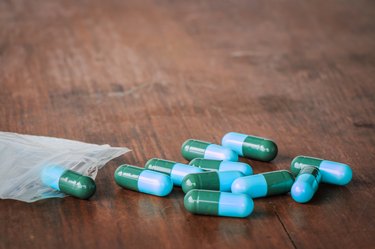
Fat-burning supplements are readily available over-the-counter and boast claims that you can lose weight without changing your diet or physical activity level. Fat burners, also called thermogenics, are marketed as aids to help burn fat by increasing your body's metabolism, which refers to the rate at which you burn calories. However, scientific evidence supporting the safety and efficacy of most fat burners is lacking. In addition, some fat burners may cause dangerous side effects and others may not have metabolism-boosting benefits at all.
Undeclared Ingredients in Some Fat Burners
Video of the Day
The Food and Drug Administration does not evaluate and test all fat burners on the market. Unfortunately, to have an edge, some manufacturers add ingredients that are not declared on the label, which could pose a serious danger. Annually, the FDA warns the public about dangerous undeclared ingredients it finds in fat burners. In 2015, the FDA identified more than 20 fat burners that contained dangerous ingredients.
Video of the Day
For example, one product contained sibutramine, a drug previously prescribed for obesity but removed from the market in 2010 due to increased risk for heart attack and stroke. Another contained an unapproved laxative known to increase the risk of cancer. Yet another contained a selective serotonin re-uptake inhibitor, which is used to treat depression and can cause seizures and increase bleeding risk in people taking medications such as blood thinners.
Certain Fat Burners May Cause Liver Damage
Fat burners have long been linked to case reports of liver damage due to these products. In 2014, an outbreak occurred that the FDA linked to one particular fat burner, which it subsequently removed from the market. The supplement caused nearly 100 cases of hepatitis -- liver inflammation -- across the United States, according to a report published in the New England Journal of Medicine in April 2014. The supplement led to 47 hospitalizations, with three patients requiring liver transplants. Information has not been released on whether the remaining hospitalizations resulted in permanent damage. In addition, one death was linked to this particular supplement. A substance called aegeline is suspected of causing these adverse effects, according to the Centers for Disease Control. Aegeline also appears on labels under its scientific name, N-[2-hydroxy-2(4-methoxyphenyl) ethyl]-3-phenyl-2-propenamide.This compound is extracted from leaves of an Indian plant called Marmelos Correa and has not been tested in humans for fat loss or exercise performance.
Negative Heart Effects Linked to Fat Burners
Many fat burners contain substances such as bitter orange, which may increase blood pressure and heart rate to levels that are not safe. Known by its botanical name Citrus aurantium, bitter orange contains synephrine alkaloids, which are stimulants found as main ingredients in fat burners sold over-the-counter and on the Internet. The National Institutes of Health report that heart attack and stroke are linked to bitter orange in healthy people with no obvious risk factors. In one case report published in the Texas Heart Institute Journal in 2009, a 24-year-old active, healthy man taking a synephrine-containing supplement experienced a blood clot in a main artery that supplies blood to the heart. He was successfully treated in the hospital and recovered. The researchers linked the adverse effect to the fat burner supplement.
Certain Fat Burners Raise Risk of Overheating
Whether or not a fat burner the potential to raise your metabolism depends on the active ingredient. Some ingredients may do this, while others lack scientific support. For example, certain ingredients such as 2,4-dinitrophenol (DNP) that is found in some fat burners that are marketed on the Internet do raise metabolism. There's no way to know exactly how far above normal a person's metabolism will rise when taking fat burners because it depends on the active ingredient and individual differences in one's body's biochemistry. However, the ingredient 2,4-dinitrophenol is linked to overheating and other dangerous effects, according to the Medical Journal of Toxicology. A review of the overheating dangers of DNP published in 2011 listed profuse sweating and erratic or rapid heart beat as possible side effects. The report indicates that as of 2011, there have been 62 deaths linked to DNP.
- US Food and Drug Administration: Tainted Weight Loss Products
- New England Journal of Medicine: Hazards of Hindsight — Monitoring the Safety of Nutritional Supplements
- National Center for Complementary and Alternative Medicine: Bitter Orange
- Journal of Medical Toxicology: 2,4-Dinitrophenol (DNP): A Weight Loss Agent with Significant Acute Toxicity and Risk of Death
- Centers for Disease Control and Prevention: Acute Hepatitis Illnesses Linked to Certain OxyElite Pro Products
- Texas Heart Institute Journal: STEMI in a 24-Year-Old Man After Use of a Synephrine-Containing Dietary Supplement